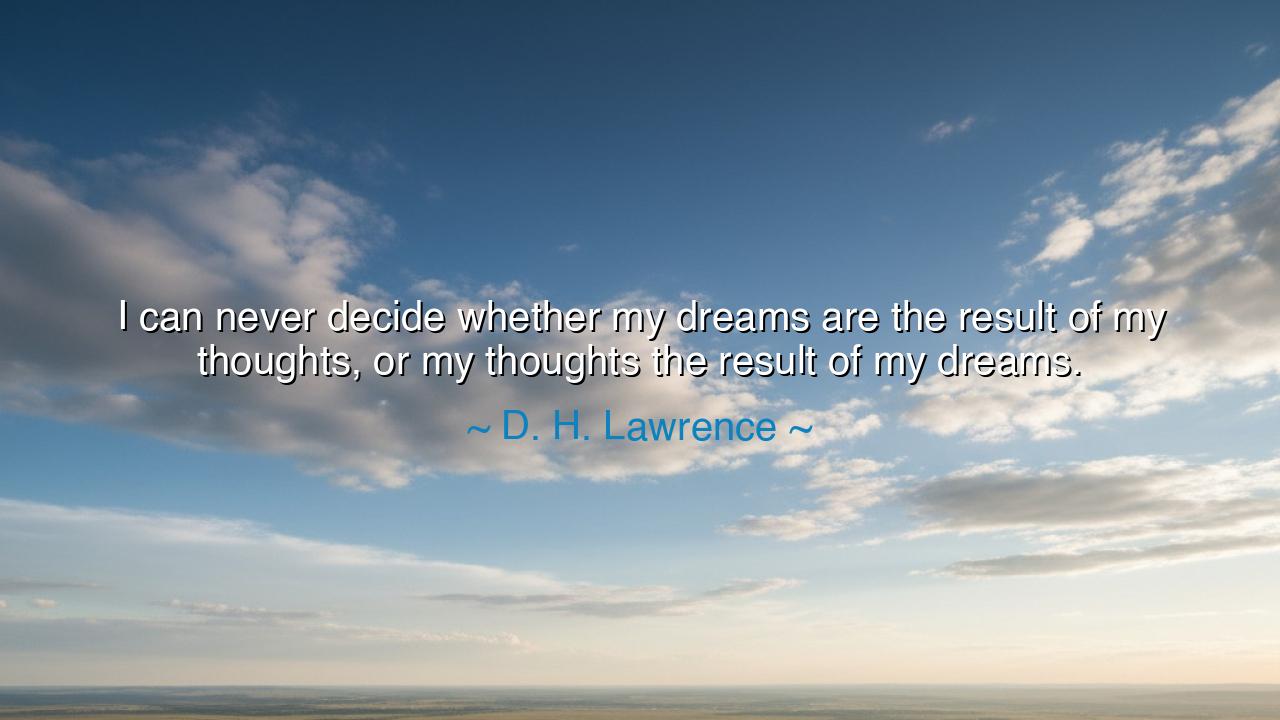
I can never decide whether my dreams are the result of my
I can never decide whether my dreams are the result of my thoughts, or my thoughts the result of my dreams.






In the pensive and introspective words of D. H. Lawrence, "I can never decide whether my dreams are the result of my thoughts, or my thoughts the result of my dreams," we are presented with a reflection on the mysterious interplay between the conscious and the subconscious mind. Lawrence’s quote touches on the very nature of the human psyche, suggesting that dreams and thoughts are inextricably linked, each shaping the other in ways that are not always clear. The profound question Lawrence poses speaks to the fluidity of the mind and the depth of human experience. Are our waking thoughts the origin of our dreams, or do our dreams—those mysterious glimpses into the unconscious—shape our waking reality? In essence, Lawrence is contemplating the delicate dance between the rational and the irrational, the known and the unknown, and how these forces come together to form the essence of who we are.
The ancients also wrestled with the question of dreams and their relationship to human consciousness. The Greek philosophers often discussed the nature of reality and the ways in which perception shaped our understanding of the world. Plato, in his work The Republic, described how the philosopher-king seeks to understand the Forms, which are the eternal, unchanging truths behind the ever-changing world of appearances. Similarly, in his allegory of the cave, Plato described how prisoners, bound in the darkness of ignorance, mistake shadows for reality. This tension between the dreams of reality and the truth behind them is akin to what Lawrence explores—the idea that what we see and perceive may not be the full picture, and that dreams—whether literal or figurative—can offer us deeper insights into the true nature of things. The dreams Plato speaks of are often those that illuminate the unseen truths of the world, while Lawrence’s dreams are more personal, shaping the inner fabric of the mind itself.
Consider the story of Socrates, whose life was shaped by the pursuit of knowledge and the search for truth. Socrates believed that the unexamined life was not worth living, yet his understanding of the world was rooted in questioning, in a constant dialogue with both his waking thoughts and his dreams of what a just society could be. He was driven by the dream of virtue and wisdom, but his thoughts, constantly shaped by conversation, continually transformed these ideals into action. Much like Lawrence’s questioning of whether thoughts shape dreams or vice versa, Socrates lived a life of contemplation where dreams of the ideal world were constantly tested and shaped by his rational thoughts. Socrates’ ability to bridge the world of dreams and thoughts speaks to the interconnectedness of both, as each is needed to form a complete understanding of the self.
Sigmund Freud, the father of modern psychoanalysis, also examined the relationship between dreams and the conscious mind. Freud believed that dreams were the unconscious mind's way of expressing repressed desires and thoughts that could not be expressed in waking life. For Freud, dreams were often the manifestation of hidden truths—desires, fears, and memories—taking form in vivid and symbolic ways. This view aligns with Lawrence's suggestion that dreams and thoughts are deeply intertwined. For Freud, it was not simply a question of whether thoughts or dreams came first, but a matter of understanding how each influenced the other. Freud’s work reminds us that thoughts have a profound impact on the dreams we experience, and vice versa, as they both stem from the same core of human emotion and psychological complexity.
The story of Albert Einstein offers another fascinating example of how dreams and thoughts can shape one another. Einstein, famously, had vivid dreams about riding on a beam of light, which led him to his groundbreaking theory of relativity. His dream of what the universe might look like, when combined with his scientific thoughts, changed the way humanity understands time, space, and reality. Einstein’s dreams did not just emerge from his thoughts, but from the interplay between his imagination, his intuition, and the rigorous thought processes that defined his scientific method. Like Lawrence, Einstein was caught in the tension between dreams and thoughts, constantly shaping one with the other to arrive at a new understanding of the universe.
The lesson we can draw from Lawrence’s words is that the boundaries between dreams and thoughts are not as rigid as we often assume. Dreams are not just random flights of fancy; they are the manifestations of our inner thoughts, fears, desires, and hopes. Similarly, our thoughts are not solely products of our conscious minds—they are shaped by our subconscious desires, emotions, and the vivid dreams that reside within us. The two realms are not opposites but are intertwined, feeding into and shaping each other in ways that are often beyond our control. Just as the ancient philosophers and modern thinkers have realized, the mind is not a simple mechanism of thoughts or dreams alone, but a complex interplay of both.
In our own lives, we must recognize the deep connection between our thoughts and our dreams. We must embrace both as vital forces in shaping our reality and understanding of the world. Our dreams are not merely fantasy, but a reflection of our innermost thoughts, and our thoughts are shaped by the dreams we carry within us. To live fully and authentically, we must cultivate both the analytical mind and the vivid imagination, using the interplay of both to guide us in our pursuits. Like Socrates, we must examine our lives and our dreams with intention, acknowledging the influence they have on one another, and allowing both to lead us to greater wisdom and truth.






AAdministratorAdministrator
Welcome, honored guests. Please leave a comment, we will respond soon